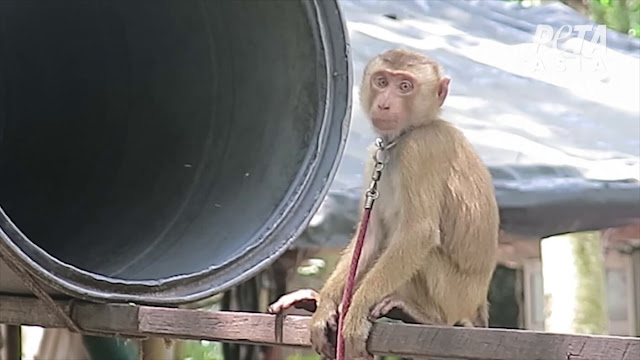Chained, confined in cages so cramped that they cannot even turn around and forced to climb trees to collect up to a thousand coconuts every day, destined for our supermarkets. An investigation by Peta has turned the spotlight on the terrible treatment of monkeys in Thailand, treated as slaves.
 |
| @Peta Asia |
For this, some British supermarkets have already banned "Chaokoh" coconut milk, after the brand's supplier was involved in PETA Asia's first undercover investigation into the use of monkeys in the collection of Thai coconuts.
We had already told you about the dark and terrible side of the coconut industry, and now this new investigation confirms this horror, in addition to the existence of real training schools to get free labour (and zero "complaints"). Thus, monkeys spend their days working to exhaustion.
Investigators from Peta Asia have documented chained monkeys - presumably caught illegally by puppies - and forced to climb palm trees. When not working as machines, animals were kept tied up, chained to old tires or confined to cages barely larger than their bodies.
 |
| @Peta Asia |
 |
| @Peta Asia |
 |
| @Peta Asia |
 |
| @Peta Asia |
In the structures, the monkeys showed repetitive and stereotyped behaviours, indicative of extreme stress. A monkey in a cage on a truck bed was repeatedly shaking its cage in a desperate and futile attempt to escape. Another monkey screaming on a rope was frantically trying to escape from a manager. An investigator has learned that if monkeys try to defend themselves, their canine teeth are even removed.
"These curious and highly intelligent animals are denied mental stimulation, companionship, freedom and everything that would make their life worth living, all to use them to collect coconuts," says Ingrid Newkirk, president of PETA. "PETA believes that practically all of Thailand's coconuts are harvested from mistreated monkeys and asks people to buy coconut products that come from elsewhere."